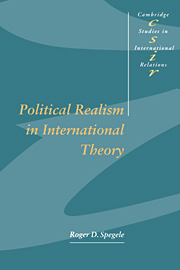3 - Emancipatory international relations: a first cut
from Part 1
Published online by Cambridge University Press: 30 October 2009
Summary
There is no such thing as a world without loss.
Sir Isaiah BerlinIntroduction
Stage-setting
Emancipatory international relations is a capacious category intended to include a large range of theories whose sources lie in German idealism, the Enlightenment and Marxism. In Chapter 1 we sorted emancipatory international relations into classical Marxism, critical international theory, poststructural theory and feminist international theory on the understanding that such categories be treated as examples only: the range of possibilities for emancipatory theory appears endless. The point of this chapter lies not in trying to capture these widely disparate and seemingly indefinite possibilities but rather to describe certain tensions within a certain version of emancipatory international relations, tensions which undermine the plausibility of its claim to unify theory and practice. These tensions stretch back to the sources of the conception; the subsequent failure to resolve them suggests why certain difficulties continue to plague more recent theoretical offerings falling under the rubric of emancipatory international relations. The goal, then, is not to follow the White Queen of Alice in Wonderland fame by doing six impossible things before breakfast, such as refuting or even adequately describing the theoretical alternatives opened up by this conception but, more modestly, to throw the project of emancipatory international relations into enough doubt so that students of international theory will be motivated to consider political realism - at least in its evaluative political realist version - as an alternative conception. And this purpose can, and should be, accomplished not by claiming that an emancipatory conception of international relations is unintelligible.
- Type
- Chapter
- Information
- Political Realism in International Theory , pp. 51 - 80Publisher: Cambridge University PressPrint publication year: 1996



